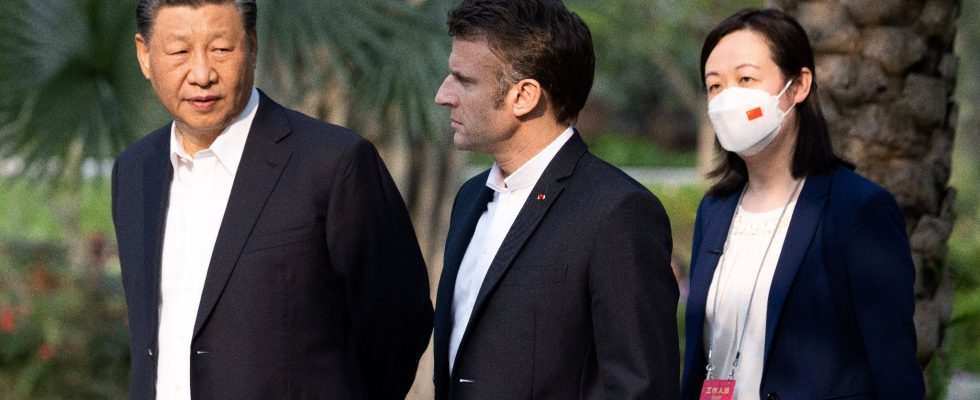Sixty years after the establishment of diplomatic relations between China and France, President Emmanuel Macron will receive his counterpart Xi Jinping during a state visit on May 6 and 7. Returning for the first time to Europe since 2019, the number one Asian superpower organized his tour under the seal of diplomatic balance: after the state visit to France, which has been asking him for a year to use his influence to bring Russia to reason, he will travel to Serbia and Hungary, two countries that have remained close to Moscow.
This Monday, the Chinese presidential couple will be welcomed at the end of the morning by Emmanuel and Brigitte Macron at the Elysée Palace, where a trilateral meeting is planned in the presence of the President of the European Commission, Ursula von der Leyen. Shortly before 3 p.m., the two heads of state will go to the Hôtel national des Invalides for an official ceremony with national anthems and review of the troops, before returning to the Elysée for a face-to-face meeting. The second day of this state visit will take the form of “a personal sequence”, according to the Elysée: the two presidential couples will go to the Hautes-Pyrénées, to the Col du Tourmalet, legendary climb of the Tour de France, where Emmanuel Macron wants to share a more intimate moment with his counterpart.
During these two days, “the President of the Republic will discuss the concerns that we may have about the activity of certain Chinese companies which could participate directly or contribute significantly to the Russian war effort”, specified the Elysée near the World. While China reaffirmed, on February 18, that it had not sold lethal weapons to Russia, through its Minister of Foreign Affairs, Wang Yi, deliveries of machine tools and components for production These weapons continued, allowing Moscow to recover its industry and gain the advantage in the conflict.
“These are not isolated incidents, but a comprehensive strategic plan implemented by China and Russia. It has had a huge impact. We believe it has contributed to helping Russia rebuild its capabilities military”, observed in front of a few journalists the Deputy Secretary of State of the United States, Kurt Campbell, passing through Paris, Thursday May 2.
But Xi Jinping would have no interest in changing his mind, according to sinologist Alain Wang, interviewed by Europe 1. “China is still at the heart of several international organizations which bring together, beyond Russia, North Korea and Iran. So, it is completely in opposition of values and thoughts in relation to the values Western and European values”, he assures.
Unfair competition
Another likely subject of discussion between Macron and Xi Jinping: Chinese state subsidies granted to several industrial sectors, notably electric vehicles, accused of distorting competition. The European Union recently launched investigations to shed light on this aid, the consequences of which could be an increase in customs duties as the United States does.
EU member countries are also studying a carbon tax at their borders on imported products that are not manufactured to the environmental standards required of European companies. In retaliation, China has already threatened to tax certain products, particularly French, in the alcohol and spirits sector such as cognac.
Ursula von der Leyen, President of the Commission, will therefore participate in the meeting with the Chinese leader on Monday. To also avoid European cacophony, Emmanuel Macron had dinner on May 2 with Chancellor Olaf Scholz in order to align their positions. Unlike France, the German economy is very dependent on China, the fourth destination for its exports and the first source of its imports. In a interview at The gallery Sunday This May 5, Emmanuel Macron also explained the difficulty in finding a European consensus, because “certain actors still see China essentially as a market of outlets, while it exports massively to Europe.”
